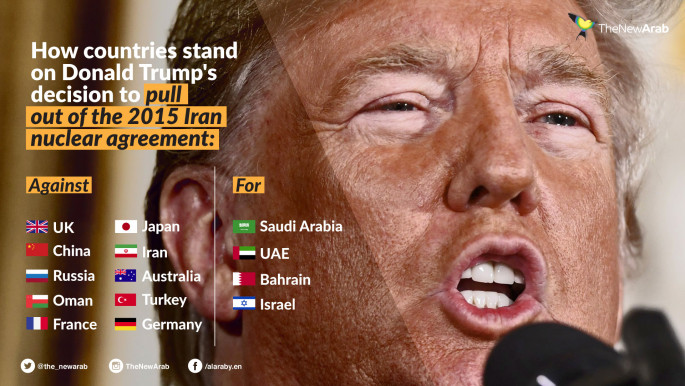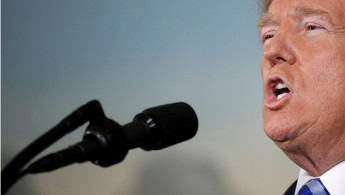How world leaders reacted to Trump's Iran decision
While Trump's friends in the Middle East - notably Israel, Saudi Arabia and the UAE - were overjoyed, there was no disguising the dismay in European capitals.
EU diplomats see the deal as the best way of keeping tabs on Iran's nuclear ambitions while heading off the risk of a destabilising new arms race in the Middle East.
Tensions are already soaring between Iran and both Israel and Gulf monarchies, and analysts fear that the uncertainties brought about by Trump's decision to slap new sanctions on Tehran could worsen the situation.
France, Germany and the UK (against)
"France, Germany and the UK regret the US decision to leave the JCPOA [Iran nuclear deal]," French President Emmanuel Macron wrote on Twitter.
"The nuclear non-proliferation regime is at stake. We will work collectively on a broader framework, covering nuclear activity, the post-2025 period, ballistic activity and stability in the Middle East, notably Syria, Yemen and Iraq."
In a joint statement from Prime Minister Theresa May, Chancellor Angela Merkel and President Emmanuel Macron, they emphasised "continuing commitment to the JCPOA [Joint Comprehensive Plan of Action]".
"We recall that the JCPOA was unanimously endorsed by the UN Security Council in Resolution 2231. This resolution remains the binding international legal framework for the resolution of the dispute about the Iranian nuclear programme. We urge all sides to remain committed to its full implementation and to act in a spirit of responsibility."
"We have already started constructive and mutually beneficial discussions on these issues, and the E3 is committed to continuing them with key partners and concerned states across the region."
The European Union (against Trump's decision)
The EU is "determined to preserve" the Iran nuclear deal despite the US withdrawal, the bloc's diplomatic chief Federica Mogherini said.
She pledged to "stay true" to Tehran, so long as Iran stuck to its commitments.
The 2015 accord "is delivering on its goal which is guaranteeing that Iran doesn't develop nuclear weapons, the European Union is determined to preserve it", Mogherini added.
UN (against)
UN Secretary-General Antonio Guterres urged the other signatories of the Iran nuclear deal to stick to their commitments, adding he was "deeply concerned" by the US decision to pull out of the agreement that he described as a "major achievement in nuclear non-proliferation and diplomacy".
 |
| [click to enlarge] |
China (against)
China joined the EU in its response - as a signatory of the JCPOA - saying it is committed to protecting the deal as it stands.
China's special envoy to the Middle East, Gong Xiaosheng, said in a press conference in Iran the agreement promoted peace.
"Having a deal is better than no deal. Dialogue is better than confrontation," he said, according to Xinhua news agency.
Russia (against)
Washington's actions were "flagrantly trampling on the norms of international law", the foreign ministry said.
Moscow claimed it is "fresh proof of Washington's inability to negotiate".
It alleged that US criticism of Iran's "absolutely legal nuclear activity" was "just a smokescreen for settling political scores with it".
Saudi Arabia, UAE and Bahrain (for)
The regional rival of Iran and long-time US ally, Saudi Arabia, said it "supports and welcomes" Trump's decision.
"The kingdom supports and welcomes the steps announced by the US president towards withdrawing from the nuclear deal... and reinstating economic sanctions against Iran," the foreign ministry said.
Riyadh's allies in the Gulf - the UAE and Bahrain - also issued statements via their foreign ministries supporting Trump's decision.
Oman (against)
Oman's ministry of foreign affairs said on Twitter that they enjoy good and cooperative relations with both the US and Iran and will continue to strengthen ties and work towards maintaining peace and stability in the region.
"We believe the US and the Islamic Republic of Iran are committed to achieving peace and stability in the region, and confrontation is not in the interest of either party."
Twitter Post
|
"The Sultanate appreciates the position of the other five partners in their commitment to adhere to the deal, contributing to both regional and international security and stability."
Australia and Japan (against)
Both Australia and Japan have also said they regret the US decision. Australia's Prime Minister Malcolm Turnbull called on all sides to use restraint in their response.
Japan hopes the US' withdrawal does not affect Iran's decision to adhere to the JCPOA said its foreign minister Taro Kono.
"We hope that the countries involved will continue to deal with the issue in a constructive manner," he added.
Turkey (against)
Turkey President Recep Tayyip Erdogan said on Wednesday that the US will "lose in the end" for its decision to withdraw from the landmark nuclear deal.
"We don't need new crises in the region," he said to CNN International.
"International covenants and international conventions cannot be annulled at will. If any document bears your signature, you need to respect that. You need to abide by that,"
Israel (for)
Prime Minister Binyamin Netanyahu praised the "bold decision to reject the disastrous nuclear deal with the terrorist regime in Tehran".
He added leaving the current deal in place was "a recipe for disaster, a disaster for our region, a disaster for the peace of the world".
"This is why Israel thinks that President Trump did an historic move."
President Trump cited a much-derided presentation by Netanyahu last week, in which he claimed to have a trove of intelligence on a pre-2003 Iranian plan to develop a nuclear weapon - information that observers say the IAEA likely already know.
Iran (against)
Iran's President Hassan Rouhani called Trump's decision "illegal" and an act of "psychological warfare", warning that Tehran could resume uranium enrichment "without limit" in response to the US withdrawal.
"I have instructed the Iranian Atomic Energy Organization to take the necessary measures for future actions so that, if necessary, we can resume industrial enrichment without limit."





 Follow the Middle East's top stories in English at The New Arab on Google News
Follow the Middle East's top stories in English at The New Arab on Google News
![The UAE is widely suspected of arming the RSF militia [Getty]](/sites/default/files/styles/image_330x185/public/2024-11/GettyImages-472529908.jpg?h=69f2b9d0&itok=Yauw3YTG)
![Netanyahu furiously denounced the ICC [Getty]](/sites/default/files/styles/image_330x185/public/2024-11/GettyImages-2169352575.jpg?h=199d8c1f&itok=-vRiruf5)
![Both Hamas and the Palestinian Authority welcomed the ICC arrest warrants [Getty]](/sites/default/files/styles/image_330x185/public/2024-11/GettyImages-2178351173.jpg?h=199d8c1f&itok=TV858iVg)